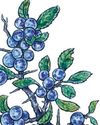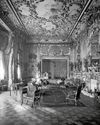
BACK in November 2015, the picturesque village of Earls Colne in the scenic Colne Valley, 3½ miles from Halstead and 10 miles from Colchester, was judged the best in Essex in a COUNTRY LIFE survey of commuter hotspots within easy access of the City of London. The same survey saw Grade II-listed Colne Priory, set in 24 acres of gardens and grounds on the banks of the River Colne, named Earls Colne's best address.
Now for sale through Strutt & Parker (020-7318 5025) and Knight Frank (020-7861 1114) at a guide price of $7 million, the imposing, red-brick country house was built in about 1825 in the Strawberry Hill Gothic style for Henry Holgate Carwardine. It was the last of a series of manor houses built on the site of a Benedictine priory founded by the de Vere family, Earls of Oxford, in the early 12th century, the remains of which lie buried under lawn in the grounds of Colne Priory and are designated a Scheduled Ancient Monument.
Following the dissolution of the medieval Colne Priory in 1536, its land and buildings were granted to John de Vere, 15th Earl of Oxford, who demolished the priory church and built a manor house on the site. In 1583, the 17th Earl, Edward de Vere, a notorious spendthrift, sold the manor of Earls Colne to his steward, Roger Harlackenden, whose son, Richard, bought the adjoining manor of Colne Priory in 1592.
Colne Priory remained in the Harlakenden family until 1672, when it passed by marriage to the Androwes family and later, in the early 18th century, to one John Wale, who demolished what remained of the medieval buildings and remodelled the old de Vere house in about 1740, reputedly furnishing it with 'chimney pieces made from the ruinated tombs of the Oxfords'.
Denne historien er fra August 03, 2022-utgaven av Country Life UK.
Start din 7-dagers gratis prøveperiode på Magzter GOLD for å få tilgang til tusenvis av utvalgte premiumhistorier og 9000+ magasiner og aviser.
Allerede abonnent ? Logg på
Denne historien er fra August 03, 2022-utgaven av Country Life UK.
Start din 7-dagers gratis prøveperiode på Magzter GOLD for å få tilgang til tusenvis av utvalgte premiumhistorier og 9000+ magasiner og aviser.
Allerede abonnent? Logg på

Kitchen garden cook - Apples
'Sweet and crisp, apples are the epitome of autumn flavour'

The original Mr Rochester
Three classic houses in North Yorkshire have come to the market; the owner of one inspired Charlotte Brontë to write Jane Eyre

Get it write
Desks, once akin to instruments of torture for scribes, have become cherished repositories of memories and secrets. Matthew Dennison charts their evolution

'Sloes hath ben my food'
A possible paint for the Picts and a definite culprit in tea fraud, the cheek-suckingly sour sloe's spiritual home is indisputably in gin, says John Wright

Souvenirs of greatness
FOR many years, some large boxes have been stored and forgotten in the dark recesses of the garage. Unpacked last week, the contents turned out to be pots: some, perhaps, nearing a century old—dense terracotta, of interesting provenance.

Plants for plants' sake
The garden at Hergest Croft, Herefordshire The home of Edward Banks The Banks family is synonymous with an extraordinary collection of trees and shrubs, many of which are presents from distinguished friends, garnered over two centuries. Be prepared to be amazed, says Charles Quest-Ritson

Capturing the castle
Seventy years after Christian Dior’s last fashion show in Scotland, the brand returned under creative director Maria Grazia Chiuri for a celebratory event honouring local craftsmanship, the beauty of the land and the Auld Alliance, explains Kim Parker

Nature's own cathedral
Our tallest native tree 'most lovely of all', the stately beech creates a shaded environment that few plants can survive. John Lewis-Stempel ventures into the enchanted woods

All that money could buy
A new book explores the lost riches of London's grand houses. Its author, Steven Brindle, looks at the residences of plutocrats built by the nouveaux riches of the late-Victorian and Edwardian ages

In with the old
Diamonds are meant to sparkle in candlelight, but many now gather dust in jewellery boxes. To wear them today, we may need to reimagine them, as Hetty Lintell discovers with her grandmother's jewellery